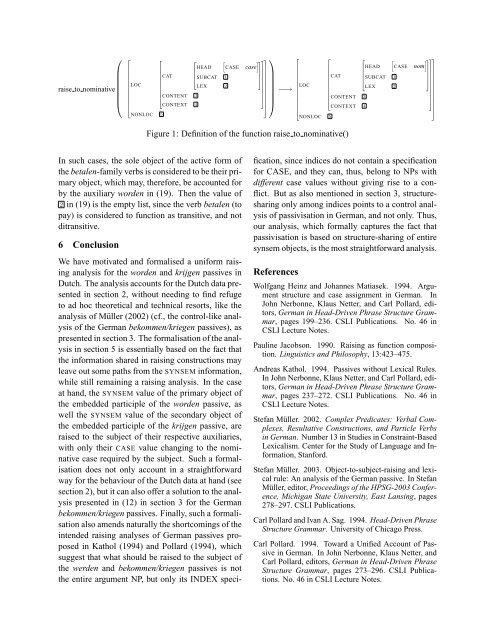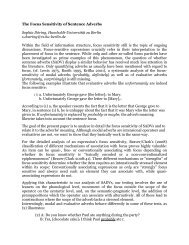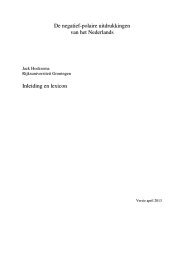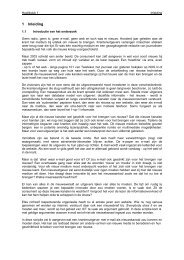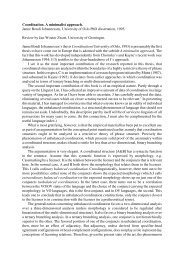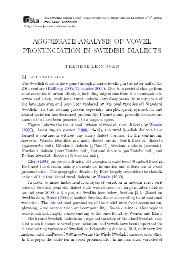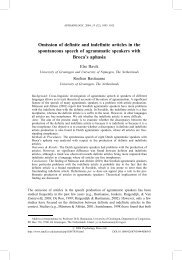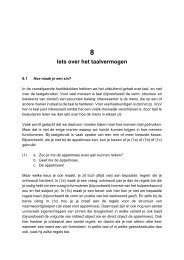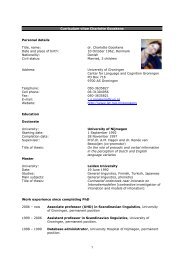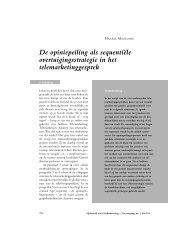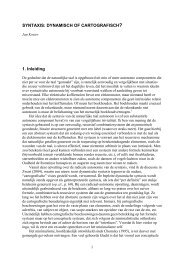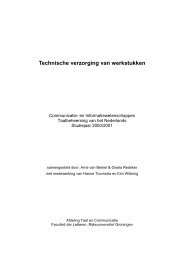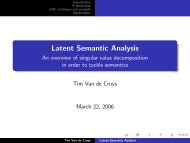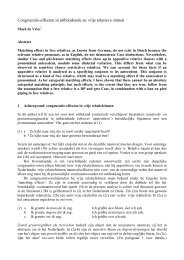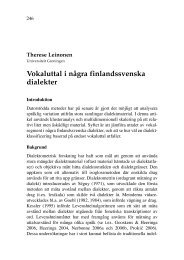Object-to-Subject Raising: An Analysis of the Dutch Passive
Object-to-Subject Raising: An Analysis of the Dutch Passive
Object-to-Subject Raising: An Analysis of the Dutch Passive
You also want an ePaper? Increase the reach of your titles
YUMPU automatically turns print PDFs into web optimized ePapers that Google loves.
⎛<br />
raise <strong>to</strong> nominative<br />
⎜<br />
⎝<br />
⎡<br />
LOC<br />
⎢<br />
⎣<br />
NONLOC 5<br />
⎡<br />
⎡ [<br />
HEAD CASE<br />
CAT ⎢<br />
⎣SUBCAT 1<br />
LEX 2<br />
⎢<br />
⎣CONTENT 3<br />
CONTEXT 4<br />
]<br />
⎤<br />
case<br />
⎦<br />
⎦<br />
⎥<br />
⎦<br />
⎞<br />
−→<br />
⎟<br />
⎠<br />
⎡<br />
LOC<br />
⎢<br />
⎣<br />
NONLOC 5<br />
⎡<br />
⎡ [<br />
HEAD CASE<br />
CAT<br />
⎢SUBCAT 1<br />
⎣<br />
LEX 2<br />
⎢<br />
⎣<br />
CONTENT 3<br />
CONTEXT 4<br />
]<br />
⎤<br />
nom<br />
⎦<br />
⎦<br />
⎥<br />
⎦<br />
Figure 1: Definition <strong>of</strong> <strong>the</strong> function raise <strong>to</strong> nominative()<br />
In such cases, <strong>the</strong> sole object <strong>of</strong> <strong>the</strong> active form <strong>of</strong><br />
<strong>the</strong> betalen-family verbs is considered <strong>to</strong> be <strong>the</strong>ir primary<br />
object, which may, <strong>the</strong>refore, be accounted for<br />
by <strong>the</strong> auxiliary worden in (19). Then <strong>the</strong> value <strong>of</strong><br />
2 in (19) is <strong>the</strong> empty list, since <strong>the</strong> verb betalen (<strong>to</strong><br />
pay) is considered <strong>to</strong> function as transitive, and not<br />
ditransitive.<br />
6 Conclusion<br />
We have motivated and formalised a uniform raising<br />
analysis for <strong>the</strong> worden and krijgen passives in<br />
<strong>Dutch</strong>. The analysis accounts for <strong>the</strong> <strong>Dutch</strong> data presented<br />
in section 2, without needing <strong>to</strong> find refuge<br />
<strong>to</strong> ad hoc <strong>the</strong>oretical and technical resorts, like <strong>the</strong><br />
analysis <strong>of</strong> Müller (2002) (cf., <strong>the</strong> control-like analysis<br />
<strong>of</strong> <strong>the</strong> German bekommen/kriegen passives), as<br />
presented in section 3. The formalisation <strong>of</strong> <strong>the</strong> analysis<br />
in section 5 is essentially based on <strong>the</strong> fact that<br />
<strong>the</strong> information shared in raising constructions may<br />
leave out some paths from <strong>the</strong> SYNSEM information,<br />
while still remaining a raising analysis. In <strong>the</strong> case<br />
at hand, <strong>the</strong> SYNSEM value <strong>of</strong> <strong>the</strong> primary object <strong>of</strong><br />
<strong>the</strong> embedded participle <strong>of</strong> <strong>the</strong> worden passive, as<br />
well <strong>the</strong> SYNSEM value <strong>of</strong> <strong>the</strong> secondary object <strong>of</strong><br />
<strong>the</strong> embedded participle <strong>of</strong> <strong>the</strong> krijgen passive, are<br />
raised <strong>to</strong> <strong>the</strong> subject <strong>of</strong> <strong>the</strong>ir respective auxiliaries,<br />
with only <strong>the</strong>ir CASE value changing <strong>to</strong> <strong>the</strong> nominative<br />
case required by <strong>the</strong> subject. Such a formalisation<br />
does not only account in a straightforward<br />
way for <strong>the</strong> behaviour <strong>of</strong> <strong>the</strong> <strong>Dutch</strong> data at hand (see<br />
section 2), but it can also <strong>of</strong>fer a solution <strong>to</strong> <strong>the</strong> analysis<br />
presented in (12) in section 3 for <strong>the</strong> German<br />
bekommen/kriegen passives. Finally, such a formalisation<br />
also amends naturally <strong>the</strong> shortcomings <strong>of</strong> <strong>the</strong><br />
intended raising analyses <strong>of</strong> German passives proposed<br />
in Kathol (1994) and Pollard (1994), which<br />
suggest that what should be raised <strong>to</strong> <strong>the</strong> subject <strong>of</strong><br />
<strong>the</strong> werden and bekommen/kriegen passives is not<br />
<strong>the</strong> entire argument NP, but only its INDEX specification,<br />
since indices do not contain a specification<br />
for CASE, and <strong>the</strong>y can, thus, belong <strong>to</strong> NPs with<br />
different case values without giving rise <strong>to</strong> a conflict.<br />
But as also mentioned in section 3, structuresharing<br />
only among indices points <strong>to</strong> a control analysis<br />
<strong>of</strong> passivisation in German, and not only. Thus,<br />
our analysis, which formally captures <strong>the</strong> fact that<br />
passivisation is based on structure-sharing <strong>of</strong> entire<br />
synsem objects, is <strong>the</strong> most straightforward analysis.<br />
References<br />
Wolfgang Heinz and Johannes Matiasek. 1994. Argument<br />
structure and case assignment in German. In<br />
John Nerbonne, Klaus Netter, and Carl Pollard, edi<strong>to</strong>rs,<br />
German in Head-Driven Phrase Structure Grammar,<br />
pages 199–236. CSLI Publications. No. 46 in<br />
CSLI Lecture Notes.<br />
Pauline Jacobson. 1990. <strong>Raising</strong> as function composition.<br />
Linguistics and Philosophy, 13:423–475.<br />
<strong>An</strong>dreas Kathol. 1994. <strong>Passive</strong>s without Lexical Rules.<br />
In John Nerbonne, Klaus Netter, and Carl Pollard, edi<strong>to</strong>rs,<br />
German in Head-Driven Phrase Structure Grammar,<br />
pages 237–272. CSLI Publications. No. 46 in<br />
CSLI Lecture Notes.<br />
Stefan Müller. 2002. Complex Predicates: Verbal Complexes,<br />
Resultative Constructions, and Particle Verbs<br />
in German. Number 13 in Studies in Constraint-Based<br />
Lexicalism. Center for <strong>the</strong> Study <strong>of</strong> Language and Information,<br />
Stanford.<br />
Stefan Müller. 2003. <strong>Object</strong>-<strong>to</strong>-subject-raising and lexical<br />
rule: <strong>An</strong> analysis <strong>of</strong> <strong>the</strong> German passive. In Stefan<br />
Müller, edi<strong>to</strong>r, Proceedings <strong>of</strong> <strong>the</strong> HPSG-2003 Conference,<br />
Michigan State University, East Lansing, pages<br />
278–297. CSLI Publications.<br />
Carl Pollard and Ivan A. Sag. 1994. Head-Driven Phrase<br />
Structure Grammar. University <strong>of</strong> Chicago Press.<br />
Carl Pollard. 1994. Toward a Unified Account <strong>of</strong> <strong>Passive</strong><br />
in German. In John Nerbonne, Klaus Netter, and<br />
Carl Pollard, edi<strong>to</strong>rs, German in Head-Driven Phrase<br />
Structure Grammar, pages 273–296. CSLI Publications.<br />
No. 46 in CSLI Lecture Notes.


